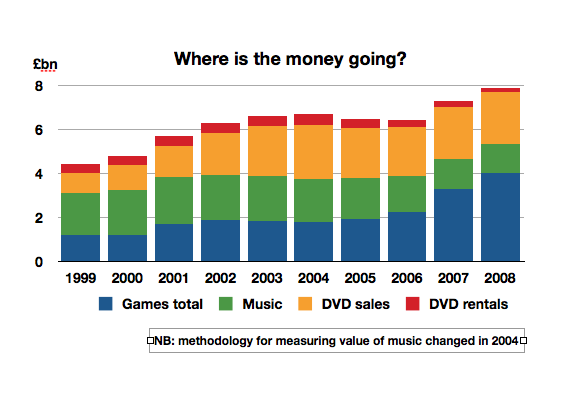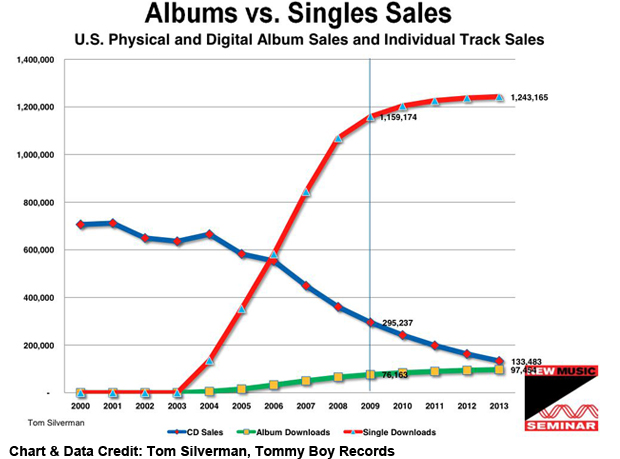You are not logged in. Please register or login.
- Topics: Active | Unanswered
Re: Duff: Quit Whining About SOPA and PIPA
Ok, so in the end the discussion is mostly about whether or not you believe the entertainment industry is really dying. So check out this graph, these are the actual figures for entertainment industry turnover in the UK:
I think it's fair to say that games, movies & music are all roughly equally susceptible to piracy, so why is it "just" the music industry that is suffering? Also, overall spending is up, not down. Might it not be that people simply find more value in other entertainment. By the way, Napster was at it's height of popularity in February of 2001, with 26 million users worldwide, I do not see even the slightest dent in the graph at that point. Actually, the music industry only started declining AFTER the shutdown of Napster in July 2001. If the impact would have been as big as everyone was stating them, slow pick-up of alternatives should have meant a jump in music sales figures. It didn't.
Could it not be because almost every digital download store is focused around singles instead of albums? Look at this chart (US figures):
Maybe, the digital age's biggest impact on the music industry has not been piracy but the fact that people now have the option of choosing only the tracks they like, cherry picking their songs.
Now, I know this is going to sound like a huge extrapolation, but for me legislation against sharing is in essence the same as legislation against selling singles. Both allegedly have a negative impact on the music industry, both are a reflection of what users want and how they value the product. Maybe music just worth as much anymore to us, amidst the wealth of other options.
Re: Duff: Quit Whining About SOPA and PIPA
I think it's fair to say that games, movies & music are all roughly equally susceptible to piracy
Ummm.... Yeah torrenting a PS3/X-Box360/Wii game and putting it on your PC is so easy.
Modern console games are not easy to emulate on PCs due to additional tech. needed.
As far as DVDs go, they only came out a decade ago in full force, obviously it would have grown since 99.
When it comes to films vs. Music. getting quality from a film picture requires more effort on average than 320Kb Music. 95% of the net is spam/virus sites as far as streaming goes, meaning the average person will download. You then go to a torrent website and what file is bigger? That film is likely more than 10x the file size of that album you want to download.
Re: Duff: Quit Whining About SOPA and PIPA
Ummm.... Yeah torrenting a PS3/X-Box360/Wii game and putting it on your PC is so easy.
Modern console games are not easy to emulate on PCs due to additional tech. needed.
As far as DVDs go, they only came out a decade ago in full force, obviously it would have grown since 99.
When it comes to films vs. Music. getting quality from a film picture requires more effort on average than 320Kb Music. 95% of the net is spam/virus sites as far as streaming goes, meaning the average person will download. You then go to a torrent website and what file is bigger? That film is likely more than 10x the file size of that album you want to download.
Well, okay, you make a fair point sir. The threshold to pirating games is definitely a bit higher than the threshold to pirating music. I don't agree about music vs video though... not at all. The majority of pirated stuff just happens to be video, check this top 100 on pirate bay: http://depiraatbaai.be/top/all
That said, I should have expressed myself differently, what I said was not exactly what I meant to say. What is probable more correct is that I think that if there was a real one-on-one correlation between piracy and a downturn in the entertainment industry you would see it happen for video, music and games alike. Maybe not to the same degree, but the trends should at least show a visible change on key points in history, such as the Napster shutdown. It just doesn't.
Re: Duff: Quit Whining About SOPA and PIPA
Would be curious if Axl commented on this.
I think it's painfully obvious how Axl will feel about this; his stereotypical reaction is usually to blame anyone else for his problems anyway, I doubt he'd see things differently on this issue.

- monkeychow
- Rep: 661
Re: Duff: Quit Whining About SOPA and PIPA
I think it's fair to say that games, movies & music are all roughly equally susceptible to piracy,
I think as internet speeds increase movie piracy will get worse. It's very do-able here but it does consume bandwith. If you could torrent a movie as fast as a CD then they'd be equal. As for games..most people I know wouldn't be able to play a copied game on their systems.
I will give you that the movie folks have insulated themselves better, double and triple dipping with release schedules, a host of special editions and so on, and of course the introduction of BD as a replacement format.
Granted the music folks were not that organised. But i also think the movie industry got the benefit of seeing what happened in music.
But i wouldn't be at all surprised if in 5-6 years time when internet is better buying DVDs in stores becomes a bit like buying a CD is now.
Also, overall spending is up, not down. Might it not be that people simply find more value in other entertainment.
I agree..but I think they find that value because now they get the music free  Which is my point: If you have X dollars a month for A, B, C in entertainment and you find a way to get A for free, then you spend the whole on B and C.
Which is my point: If you have X dollars a month for A, B, C in entertainment and you find a way to get A for free, then you spend the whole on B and C.
But eventually the people who make A need to be paid.
To me it's just logical, some people have a "support the artist" thing, and some people have a "i like tactile stuff in my hands" thing, but in general, if you can get something free you generally don't then go and pay for it - unless you get some other kind of convenience by doing so.
So what it comes down to for me is that if people are finding more value in other entertainment - why is that? It's because they can get music anyway illegally.
Rather than choose between a DVD and a CD, you just buy the DVD and torrent the CD, then you get both.
If your net connection is up to it you can torrent the DVD too, then you can maybe go buy a ps3 game or go get some beers or something. I think the spending is the same, but that the industries who'se stuff is made free will eventually be destroyed if it continues.
By the way, Napster was at it's height of popularity in February of 2001, with 26 million users worldwide, I do not see even the slightest dent in the graph at that point.
Actually, the music industry only started declining AFTER the shutdown of Napster in July 2001.
That was the height of Napster's popularity, but in the social context of a shift in regular people's mindset from music being a paid commodity to being free, Napster was just a stepping stone.
In music-stealing terms it was an early adoption technology, made popular with college kids. In the global terms of the music trade the 26 million people using Naspster wasn't that much...but as each one closed a new service opened and piracy moved from a nerdy college thing to do to becoming mainstream.
Before limewire was closed 17% of the US internet population was using it.
And that's without all the other services.
The impact you are looking for took a couple of years to kick in because of the size of the whole.
Megaupload was claiming to have 50 million users per day!
To me it's like how a few people were on Friendster but even my Mum uses Facebook....Napster was an early adoption bubble...but piracy is now getting more an more normal in the community and it took a while for it to reach the critical mass needed to dent the numbers of an industry the size of music. But the constant fall in CD sales tells the story. Digital single sales slowly rise, and CD sales fall...and somewhere i n the middle is all the stuff we stole online 
Now, I know this is going to sound like a huge extrapolation, but for me legislation against sharing is in essence the same as legislation against selling singles.
Not sure I follow you there. No one wants to shut down legitimate places to buy singles like Amazon and Itunes do they? They just want you to pay for the products you consume 
Re: Duff: Quit Whining About SOPA and PIPA
And Duff's response was even better than the first. He's giving people a view of the argument they don't want to hear about. He's pretty open about his misgivings in the bill, like I said before, it could be better. But at the end of the day, the very companies that are protesting the bill could have avoided this by policing themselves. They refused, for obvious reasons.
And I remember very clearly how all those bands supported Napster (that didn't last), and then bands like Tool started asking downloaders to start giving bands like Clutch ten bucks for every album they leached, because those bands were being hurt the most.

- mickronson
- Rep: 118
Re: Duff: Quit Whining About SOPA and PIPA
Duff back-pedalled mainly because his main hardcore fanbase gave him shit over it and him thinking 'this is my bread and butter' pedals back like a motherfucker. The 2 or 3 main people against him I thought would be the 2 or 3 up his ass on this, but I was so wrong, happily. As for them bringing down Megaupload only, at this point in time, the point in time it was about to launch a legal iTunes alternative service. Conspiracy much
Re: Duff: Quit Whining About SOPA and PIPA
I think as internet speeds increase movie piracy will get worse. It's very do-able here but it does consume bandwith. If you could torrent a movie as fast as a CD then they'd be equal.
I agree..but I think they find that value because now they get the music free
Which is my point: If you have X dollars a month for A, B, C in entertainment and you find a way to get A for free, then you spend the whole on B and C.
But eventually the people who make A need to be paid.
So do the people who make B and C. If the people who made A made an attractive enough product, made it easy enough to get, made good promotion for it, etc... maybe they would take back some of those B and C sales?
So what it comes down to for me is that if people are finding more value in other entertainment - why is that? It's because they can get music anyway illegally.
Rather than choose between a DVD and a CD, you just buy the DVD and torrent the CD, then you get both.
You know, I think you're really just assuming music is being hit much harder than the other industries here. I don't know if you've read my follow up post (answer to Atari), but I think movies are being torrented WAY more than music. You're entire argument is based on the unproven assumption that music has a tougher time standing up to piracy. I don't believe so, and in all honesty, I have yet to see (non-industry sponsored) statistics that back this up. Me personally, I never download music. There's very little need with legal and mostly free services like Spotify available to me. I do download roughly 100GB of TV series and movies every month, but that's not even illegal here in Belgium and most of Western Europe. But let me tell you something, I rarely buy a CD anymore either. There's just nothing good enough to own that's being released on major labels anymore these days. Last album I bought was by a Belgian band called Ostend Powers, who I had to e-mail to get the album as they don't have a record label. Their album was recorded & mixed in two weeks in a pro studio for 300€ a day, and the production value is through the roof. They've sold around 1000 CD's by now, at 10€ per disc. I dunno, that seems to work for me.
If your net connection is up to it you can torrent the DVD too, then you can maybe go buy a ps3 game or go get some beers or something. I think the spending is the same, but that the industries who'se stuff is made free will eventually be destroyed if it continues.
I think in 2012 the "size" argument no longer applies really.
That was the height of Napster's popularity, but in the social context of a shift in regular people's mindset from music being a paid commodity to being free, Napster was just a stepping stone.
In music-stealing terms it was an early adoption technology, made popular with college kids. In the global terms of the music trade the 26 million people using Naspster wasn't that much...but as each one closed a new service opened and piracy moved from a nerdy college thing to do to becoming mainstream.
Before limewire was closed 17% of the US internet population was using it.
And that's without all the other services.
I don't know where you get the 17% figure, but at it's height in 2006-2007 the gnutella network had roughly 4-5 million active "nodes" (extrapolation, last known figure as 3 million in january 2006). Nothing compared to Napster.
The impact you are looking for took a couple of years to kick in because of the size of the whole.
I agree that the growth of the phenomenon is gradual, but almost as a direct result of that the impact should have been immediate whenever one of the biggest services was shut down. It wasn't.
Megaupload was claiming to have 50 million users per day!
Yes, porn is responsible for quite a large chunk of day-to-day internet traffic  . But again, if there is a real correlation between sharing and music sales, we should see a huge rise in music sales over the coming weeks & months. Interesting times indeed.
. But again, if there is a real correlation between sharing and music sales, we should see a huge rise in music sales over the coming weeks & months. Interesting times indeed.
Not sure I follow you there. No one wants to shut down legitimate places to buy singles like Amazon and Itunes do they? They just want you to pay for the products you consume
I'm saying that government intervention through SOPA/PIPA would be on the same plane as government regulation forbidding iTunes. Not saying they are doing this, it would be too silly for words. But so were SOPA/PIPA.
One more, just to be sure. An independent study in Sweden shows that file sharers and non-sharers buy roughly the same amount of CD's, however file sharers buy MORE singles from legal sources like Amazon & iTunes than non-sharers. Again, show me the correlation between sharing and the decline of the music industry.
(oh, by the way, source: http://www.techdirt.com/articles/201111 … hand.shtml )
Factors that are MUCH more likely to be reason for the downfall:
- The lack of quality being pushed by big labels
- Focus on singles instead of albums
- No big national network to promote music anymore (wtf MTV?!??)
- Unrealistic pricing schemes
- Economic downturn
- Audiences with shorter attention span, lots more one-hit wonders
- ...
